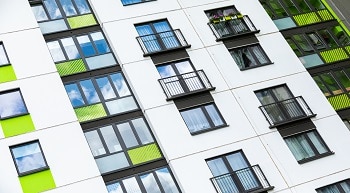Student Specific Accommodation (SSA) is housing built or designated for students. This includes purpose-built student accommodation (PBSA) and accommodation that is let for the sole purpose of providing accommodation to students during the academic year. While PBSA is an important component of the government’s housing strategy, its critics argue that PBSA is built for profit and not according to what students need.
In recent years, the unprecedented growth in those participating in higher education – 168,000 in 2014 to an estimated 193,000 in 2024 has led to an increase in demand for suitable student accommodation. In tandem, the purpose-built student accommodation sector (PBSA) has seen significant growth, between 2014 and 2020, almost €950m worth of PBSA assets transacted. From an investment perspective, being relatively insulated from market cycles, student housing performs well.
The Government’s Rebuilding Ireland Action Plan 2016 underlined the importance of providing well designed and located student accommodation to meet demand. The objective of the Government’s National Student Accommodation Strategy 2017, was to incentivise affordable student housing and ensure an increased supply of PBSA bed spaces - an additional 21,000 places by 2024 – to ease demand pressures in the private rented sector (PRS). The strategy also highlighted the significant upfront capital investment required to increase PBSA supply and the necessity to seek the funding shortfall from private developers. Recent reports indicate of the 8,229 PBSA units completed since 2016, 84% are privately delivered and €87 million in tax breaks granted to the PBSA providers.
The Residential Tenancies Acts 2004 to 2020 deal with the regulation of the mainstream PRS including the approved housing body (AHB) sector. The Residential Tenancies (Amendment) Act 2019 brought SSA under the remit of the RTB in July 2019. This means that SSA tenants have most of the same rights as private tenants (excluding Part 4 provisions).
Under the Residential Tenancies (No. 2) Bill 2021 students now have safeguards in place around the payment of rent in advance, notice periods and refunds. The Bill ensures any upfront payment upon the commencement of a tenancy is restricted to a total value that does not exceed two months’ rent i.e., a deposit and one month rent in advance. This restriction applies to all tenancies including for students. A student can make a larger upfront payment by way of an opt-out option but they cannot be forced to do so. The Bill also provides that the notice period in respect of student specific accommodation is limited to a maximum 28 days’ notice. All SSA providers must now comply with the law governing rent reviews. From 16 July 2021, for tenancies in a Rent Pressure Zone (RPZ), rent calculations are based on the Harmonised Index of the Consumer Price (HICP) values.
Critics of PBSA development argue there is an over reliance on the private sector for its provision and the reason why the cost of PBSA is rising beyond the reach of the average student. In terms of rents charged for accommodation within PBSA schemes for the 2020/2021 academic year, rates varied depending on schemes but the average advertised headline rent in Dublin was approximately €9,000 for 39 weeks in line with the previous year. Some operators offer incentives to take-up accommodation and as such, the average effective rent was about 2% less overall.
More recently, PBSA providers report a lack of student demand that has led to Dublin City Council (DCC) granting permission to convert student beds to short-term lets. These change-of-use decisions have led to some serious accusations that DCC is perpetuating the student housing crisis.
Purpose-built student accommodation is defined as housing built or designated for students. Between 2014 and 2020, almost €950m worth of PBSA assets have transacted in Ireland and €87 million given to the private operators in tax breaks. Clearly PBSA is an important component of the government’s housing strategy but its critics argue this is housing that is built for profit and not according to what students need.

